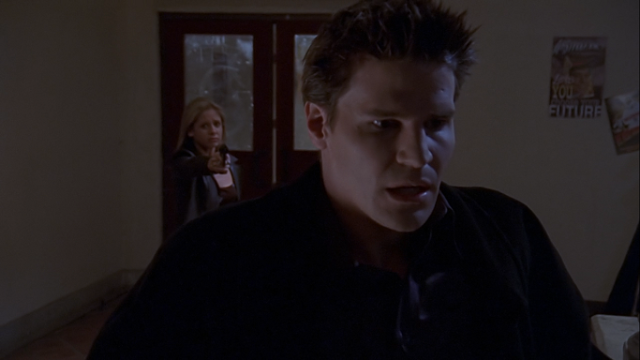This is another one of those essays that’s less about understanding something and more about the lack of it. “I Only Have Eyes For You” is perfectly comprehensible to me; our title character investigates a poltergeist situation in which a teenage boy in a romantic relationship with his teacher shot her and then himself after she tried to end it, and the poltergeist activity is a result of him forcing people to reenact that until he can find someone who understands what he’s going through. At the time, Buffy is nursing a deep hurt after having sex with Angel only for him to suddenly lose his soul and turn evil, and the solution turns out to be having Buffy play the role of the shooter and Angel play the role of the murdered teacher. She, more than anyone, knows how it feels to be wounded by romantic betrayal, and it’s seeing this that eases the spirit’s soul, allows him to move on, and ends the chaos. That’s the stuff I get; what I don’t get is why only me and this episode seem to comprehend that.
Like many Monster O’ The Week stories on Buffy, the monster serves as a metaphor for a standard emotional issue, and in this case I’m very obviously describing a paranormal riff on the concept of emotional empathy. At the beginning, Buffy engages in some of the very behaviour I find confusing, in which she loudly proclaims this guy is a bad person who deserves to suffer. When I say I find it confusing, I don’t mean that I don’t understand where it comes from – moral outrage makes one feel powerful and smart and in control. It’s easy and superficially satisfying and probably true to say “I would simply not shoot and murder my spurned lover”. But when Buffy lets go of that and simply says “I know how you were feeling when you did this and I would do the same thing”, two practical outcomes happen.
One: the ghost stops. He is freed of his torment and is no longer a danger to others. Now in this case, there is the slight narrative cheat in that, being that he’s already dead, it’s impossible to achieve this outcome by killing him. But even outside of school shooters, there a lot of much less deadly sins committed by people that could be cured by simply relating to them as human beings. You can talk to me until you’re blue in the face about how they don’t deserve it and that it’s not on you to fix these people, and to an extent you’re someone passing the buck because it’s too hard or too ugly or too much work to do the right thing, and to an extent you’re completely right – people only find what they’re looking for, and some people want to spend their lives torturing themselves.
Two: Buffy feels better. We see that not only does it help Buffy to play-act this little psychodrama, it even helps her that the ghost could relate to her, and she to him. She forgives herself for being weak and stupid enough to get into the whole Angel situation in the first place, because she can see herself from the outside and she can see that her actions and feelings made sense. It turns Angel from an emotional problem (I hate Angel and he must be punished; I hate myself for falling for him and must be punished) into a practical one (how do I stop Angel from killing people?).
I can put my money where my mouth is here – Buffy’s situation in this episode specifically reminds me of my relationship with my Mum. Earlier this year, my mother brought up in conversation that she thought the way she had treated me in childhood was abusive, and I was taken aback. Long before that conversation – long before I ever stumbled upon some guy’s writing about a cop show that led to me posting here – I had considered this and come to the same conclusion. I had also considered where my mother was at the time she had me; I decided that if I had had kids at her age, and I had grown up in the authoritarian culture she did, and I had her peculiar intelligence, and I only had access to the information she did in the Nineties, and I had as little money as her… I would have beat my kids and subject them to humiliating punishment rituals as well. That made it easier to let it go. I decided I didn’t even need any acknowledgement from her on this front; I had long stopped thinking about it by the time she brought it up on her own.
Which brings me to the third, significantly less practical reason for empathising with others: it’s inherently pleasurable. I listen to other people talk about empathy and I’m confused about their relationship to it. It has become oddly fashionable the past couple of years to insult someone by articulating their view with the word ‘imagine’ appended to the start (“Imagine getting attached to a two-decade-old show for teenagers.”), as if being able to picture someone’s else perspective is inherently ludicrous. Hell, my whole relationship with art is to seek out new perspectives and understand them; much as I love seeing myself reflected back to myself (as has effectively happened here), I love immersing myself in a different point of view. That ‘click’ of understanding is a sense of connection to another human being and a new experience. Apparently, for others, this is an exhausting experience as opposed to an invigorating one. Maybe I’ll find another episode about that and then I’ll get it.

